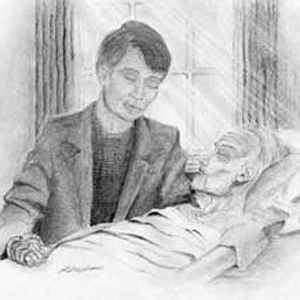
The Faces of Grief: Addressing Spiritual And Bereavement Needs
Learning OutcomesAs a result of participating in this learning activity the learner will be able to:
- Demonstrate knowledge of methods to comfortably assess and address the spiritual and bereavement needs of the patient and family with education, resources, and information as evidenced by passing the final exam with a score of 80% or higher at the end of the on-line learning activity.
This is a self-paced course with optional knowledge check quizzes after each lesson. These non-graded quizzes allow you to check your understanding of the lesson objectives before proceeding to the next lesson. After the final lesson you will be required to take the final exam. You must score 80% or higher to pass the course and obtain a certificate of completion.
- Compare and contrast spirituality and religion
- Identify your spiritual experiences and influences
- Identify the spiritual needs of a dying patient and his or her family
- Describe methods to meet their needs
- Explore the methods of spiritual assessment
- Outline barriers in meeting a patient's spiritual needs
- Demonstrate the relationship between finding purpose in meaning of life and in finding hope
- List five ways that may validate a patient's purpose in life
- Define the relationship between pre-planning a funeral and finding meaning in death
- Identify commonly known experiences of grief and loss
- Define common grief reactions
- Describe the role of the professional in supporting the bereaved
- Describe the ways in which the bereaved may find solace.
- Describe the special needs of a child experiencing death
- Outline methods of grief support for the adolescent and teen
- Describe the importance of rituals and commemorations in the grieving process.
- Offer three examples of questions you might ask the patient while exploring their feelings of loss.
- Identify two common feelings that may be experienced by the bereaved following the death of their loved one.
- List three options for grief support found in most communities
- Define the benefits of a grief support group
- Define the responsibility of hospice for bereavement
- Define complicated grief
2 Contact Hour: based on 60 minute contact hour
The estimated time for completion for this activity is 2 hour(s).
Health care professionals and volunteers to: include Registered Nurses, Licensed Practical Nurses, Social Workers, Physicians, Chaplains/Counselors, Home Healthaides, Certified Nursing Assistants, Homemakers, Volunteers, Therapists, and others interested in hospice services and information.
Kathy Richie, BSN, RN, Lores Vlaminck, RN, BSN, MA, Technical Nurse Consultant, Lores Consulting
HLC Institution ID:1399
The named licensee must retain this Certificate of Completion for a minimum of four (4) years.
Commercial Support: No commercial support was accepted for the development of this course.
Bias: This course provides a balanced view of therapeutic options and is free of commercial bias for or against any product or commercial entity. Use of generic names is always considered before using trade names. Consequently, if trade names are necessary, when available, trade names from several companies will be used. RCTC and the course planning team do not endorse any products or drugs that may be mentioned in this course.
Lores Vlaminck - RN BSN MA Technical Nurse Consultant Lores Consulting
Lores received both her Bachelors of Science Degree in Nursing and her Master's in Nursing Education from Bethel University, St. Paul, MN. Lores has a varied background of healthcare experience to include acute and critical care, clinical nurse specialist, and most recently, 19 years of experience as the founder and director of a rural home care and hospice agency.
Lores' passion is education for health care professionals, para-professionals, volunteers, and the community at large in the specialty of end-of-life care. Lores offers seminars, training, orientation, coaching, presentations, compliance monitoring, and mentoring for home care, hospice agencies, and health care organizations.
Materials used in connection with this course may be subject to copyright protection. Retention of the materials for longer than the class term, unauthorized further dissemination of the materials, or use of copyrighted materials in any way other than intended for this class is prohibited by Copyright and Teach Act laws.
This course was developed with Rochester Community and Technical College's Continuing Education and Workforce Development Division located in Rochester Minnesota. Development was funded from the Minnesota State Colleges and Universities System.